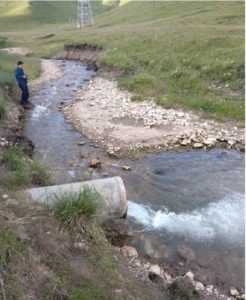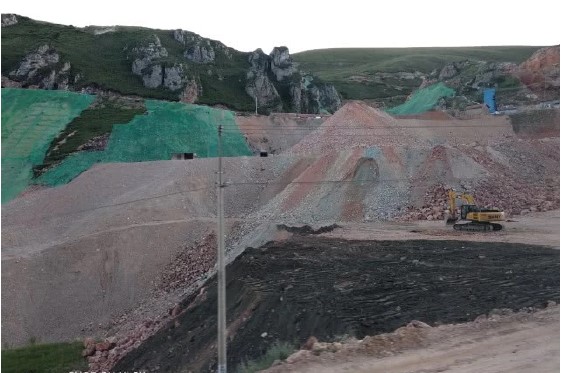Gold Mining’s Legacy in Tibet

Toxic mine water dumped into the Gurchu river, a Class II water body. [Photo: Chinese Ministry of Ecology and Environment]
Photo: TCHRD
Gold mining in the Tibetan Autonomous Region (TAR) is causing “irreversible environmental damage and poisoning of drinking water sources with cyanide, arsenic, mercury and lead”, according to a new report by the Tibetan Centre for Human Rights and Democracy (TCHRD) published on October 4.
The report, quoting the Chinese state media Beijing News, says than an inspection conducted by the Chinese Central Government between July 17 – 28 this year has found that a number of gold mining companies, including state-owned Gansu Maqu Gold Industry Co Ltd and Xiahe County Binghua Mining Co Ltd, have not been following the procedures stipulated by the environmental authorities.
Inspections began in 2016, following which stricter environmental protection policies were introduced. October 2017 saw Chinese President Xi Jinping promising improved ecological protection at the Communist Party Congress; China Daily quoted President Xi Jinping directly, as saying that we must “cherish the environment as we cherish our own lives”, he also talked about conserving our natural resources, such as rivers. However, the report this year states that since then, slow progress has been made on renovation and restoration work, which is increasing the risk to the environment. Additionally, it stated that the recommendations of made following the 2016 round of inspections have not been followed; these recommendations included suggestions for the proper storage of waste materials. The TCHRD report quotes the Beijing News as saying that the latest inspection found numerous violations, including the improper storage of waste materials and incorrect disposal of wastewater containing poisons such as cyanide, arsenic and mercury. As a result, sources of drinking water in Machu and Sangchu counties have become seriously polluted.
The most recent inspection of Gansu Maqu Gold Industry Company, which is the largest state-owned gold mining company in Machu county, found that waste materials were not being properly disposed of and more than 1000 cubic metres of toxic water was flowing into the Gurchu river daily. The Gurchu river is a tributary of the Machu (Yellow River); it is the second-longest river in China and the sixth-longest river in the world, 140 million people downstream in neighboring countries depend on it for their drinking water and irrigation. Furthermore, inspections of the Jiagantan Gold Mine, which is owned by Xiahe County Binghua Mining Co. Ltd., revealed that cyanide waste, which is identified as hazardous waste, was being disposed of as solid waste and therefore causing serious damage to the environment.



comment 0